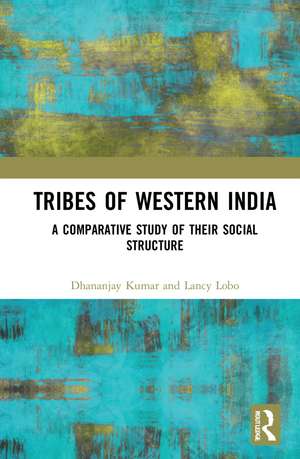Tribes of Western India: A Comparative Study of Their Social Structure
Autor Dhananjay Kumar, Lancy Loboen Limba Engleză Paperback – 29 ian 2024
This volume emerges out of an in-depth empirical study of the social structure of five Scheduled Tribes (STs) in Gujarat, western India, viz., Gamit, Vasava, Chaudhari, Kukana and Warli. It analyses and compares their internal social organisation consisting of institutions of household, family, lineage, clan, kinship rules and marriage networks. The book also deals with changes taking place in the social structure of contemporary tribal societies. While the focus is mainly on the data from tribes of western India, the issues are relevant to pan-Indian tribes.
An important contribution to the studies on tribes of India, this book will be of great interest to students and researchers of anthropology, sociology, demography, history, tribal studies, social work, public policy and law. It will also be of interest to professionals working with NGOs and civil society, programme and policy formulating authorities and bureaucrats.
| Toate formatele și edițiile | Preț | Express |
|---|---|---|
| Paperback (1) | 259.98 lei 6-8 săpt. | |
| Taylor & Francis – 29 ian 2024 | 259.98 lei 6-8 săpt. | |
| Hardback (1) | 1000.27 lei 6-8 săpt. | |
| Taylor & Francis – 29 iul 2022 | 1000.27 lei 6-8 săpt. |
Preț: 259.98 lei
Preț vechi: 326.49 lei
-20% Nou
Puncte Express: 390
Preț estimativ în valută:
49.75€ • 51.50$ • 42.05£
49.75€ • 51.50$ • 42.05£
Carte tipărită la comandă
Livrare economică 05-19 martie
Preluare comenzi: 021 569.72.76
Specificații
ISBN-13: 9781032290508
ISBN-10: 1032290501
Pagini: 278
Ilustrații: 78
Dimensiuni: 156 x 234 mm
Greutate: 0.45 kg
Ediția:1
Editura: Taylor & Francis
Colecția Routledge India
Locul publicării:Oxford, United Kingdom
ISBN-10: 1032290501
Pagini: 278
Ilustrații: 78
Dimensiuni: 156 x 234 mm
Greutate: 0.45 kg
Ediția:1
Editura: Taylor & Francis
Colecția Routledge India
Locul publicării:Oxford, United Kingdom
Public țintă
PostgraduateCuprins
1. Introduction: Social Structure of Tribes in Western India, 2. Profile of Gujarat Tribes, 3. Kinship System, 4. Kinship Behaviour, 5. Marriage Networks and Social Space, 6. Taxonomy of Households - Part I: Simple Households, 7. Taxonomy of Households - Part II: Complex Households, 8. Social Structure and Change in Tribes, Appendix I: Kinship Terms of Five Tribes in South Gujarat, Appendix II: Kin Terms from Children’s Perspective, Appendix III: Kinship Terms from Wife's Perspective, Appendix IV: Kinship Terms from Husband’s Perspective, Appendix V: Some More Kinship Terms for Group of Relatives, Appendix VI: Generation-wise Kinship Terms among Five Tribes of South Gujarat, Appendix VII: Abbreviations for Kin Types.
Notă biografică
Dhananjay Kumar is currently teaching at the Department of Anthropology, Kalahandi University, Odisha, India. Earlier he worked as an Assistant Professor at the Centre for Culture and Development, Vadodara, Gujarat, India. He did his post-graduation in Anthropology from the University of Delhi and has a doctorate in Social Anthropology from the Department of Humanities and Social Sciences, National Institute of Technology, Rourkela, Odisha, India.
Lancy Lobo has been Professor and Director at the Centre for Social Studies, Surat, India. He holds a master’s degree in Anthropology and a doctoral degree in Sociology from the Delhi School of Economics, University of Delhi, India. He is also the Founder-Director at the Centre for Culture and Development, Vadodara, India. Currently, he is a research scholar at the Indian Social Institute, Delhi, India.
Lancy Lobo has been Professor and Director at the Centre for Social Studies, Surat, India. He holds a master’s degree in Anthropology and a doctoral degree in Sociology from the Delhi School of Economics, University of Delhi, India. He is also the Founder-Director at the Centre for Culture and Development, Vadodara, India. Currently, he is a research scholar at the Indian Social Institute, Delhi, India.
Descriere
This volume presents an in-depth empirical study of the social structure of five Scheduled Tribes (STs) in Gujarat, Western India, viz., Gamit, Vasava, Chaudhari, Kukana, and Warli. It analyses their internal social organization consisting of institutions of household, family, lineage, clan, kinship rules and marriage networks.
